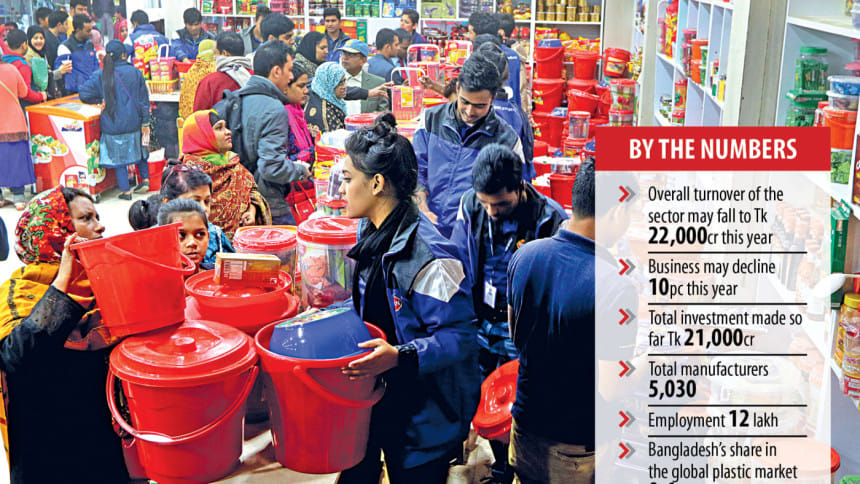Plastic makers were hard-pressed but now expect a comeback

The outbreak of Covid-19 and the subsequent lockdown put the plastic industry in Bangladesh into serious trouble in the first three months of the crisis.
The industry began recovering after the reopening of the economy from June. Yet, it will not post positive growth in 2020 as the demand in both local and global markets remained weak for most of the year.
Overall, the domestic sales of the industry may decline to Tk 22,000 crore this year, said industry operators.
"Plastic manufacturers faced difficulties at home and abroad this year due to the pandemic as local demand declined along with exports," said KM Iqbal Hossain, vice-president of the Bangladesh Plastic Goods Manufacturers & Exporters Association (BPGMEA).
He said the industry made a slight improvement in the recent months compared to the initial period of the pandemic.
The industry had been growing at 20 per cent annually on the back of spiralling demand from domestic and export markets until the pandemic arrived on the shores of the country in March.
The growth came to a halt this year, said the BPGMEA.
RN Paul, managing director of Pran-RFL Group, which manufactures plastic products, said the local market had recovered to some extent recently as consumers bought household plastic products.
"However, people now spend only on necessary items as they are cautious in spending," he said.
Towhid Tusher Khan, marketing manager of ACI Premio Plastics, said domestic demand rebounded during the June to August period. The demand for household plastic items recovered mostly.
However, he said, the overall sales of the plastic industry might decline between 5 per cent and 10 per cent in 2020 compared to 2019.
In terms of exports, the shipment of plastic products fell 10 per cent year-on-year to $43.45 million from July to November period, data from the Export Promotion Bureau showed.
Exporters fetched $48.89 million in the first five months of the last fiscal year.
More than 140 plastic items are manufactured in Bangladesh, and the country mainly exports intermediate products such as film plastic, household items and garment accessories to the US, Canada, the EU, China, India and Nepal.
"Exports dropped as buyers, especially from Germany and Italy, drastically cut orders in the last quarter of the last fiscal year due to the pandemic," said Hossain, also the chairman of Thai Delux Plastic Industries.
Germany and Italy are still two of the hardest-hit European countries by Covid-19. As of December 20, Germany has 1,493,961 confirmed coronavirus cases, and the number is even higher for Italy at 1,938,083.
The orders fell as European countries went for a closure of shops and supermarkets to stop the spread of the deadly pathogen, Hossain said.
Paul said Pran-RFL Group, which exports plastic goods to 60 countries, including Australia and EU nations, was on its way to recovery in the last quarter in 2020 despite facing difficulties in export markets owing to the coronavirus.
The export of household items rose four times although the quantity is insignificant, said Khan of ACI.
Another bright spot is the export of plastic waste.
Shipment for PET (polyethylene terephthalate) rose 150.52 per cent year-on-year during the July-November period as China started importing PET bottle scraps.
Bangladesh makes several types of extrusion material, moulding, thermosetting conversions like manufacturing of PVC pipes, shopping bags, injection moulding products, garment bags, woven bags, PET/PE bottles, laminated packages, rigid sheets, garment accessories, household items, cosmetics, and medicine packs.
The government provides a 10 per cent cash incentive to the exporters. Yet, Bangladesh's share in the $546 billion global market for plastics is less than 1 per cent, according to the BPGMEA.
Paul hoped that the industry would return to its previous growth momentum once coronavirus vaccines are available in Bangladesh.
Firms invested around Tk 21,000 crore to make plastic goods for the local and international markets.
More than 5,000 small, medium and large factories are operating in the country, employing nearly 12 lakh people.

 For all latest news, follow The Daily Star's Google News channel.
For all latest news, follow The Daily Star's Google News channel. 



Comments